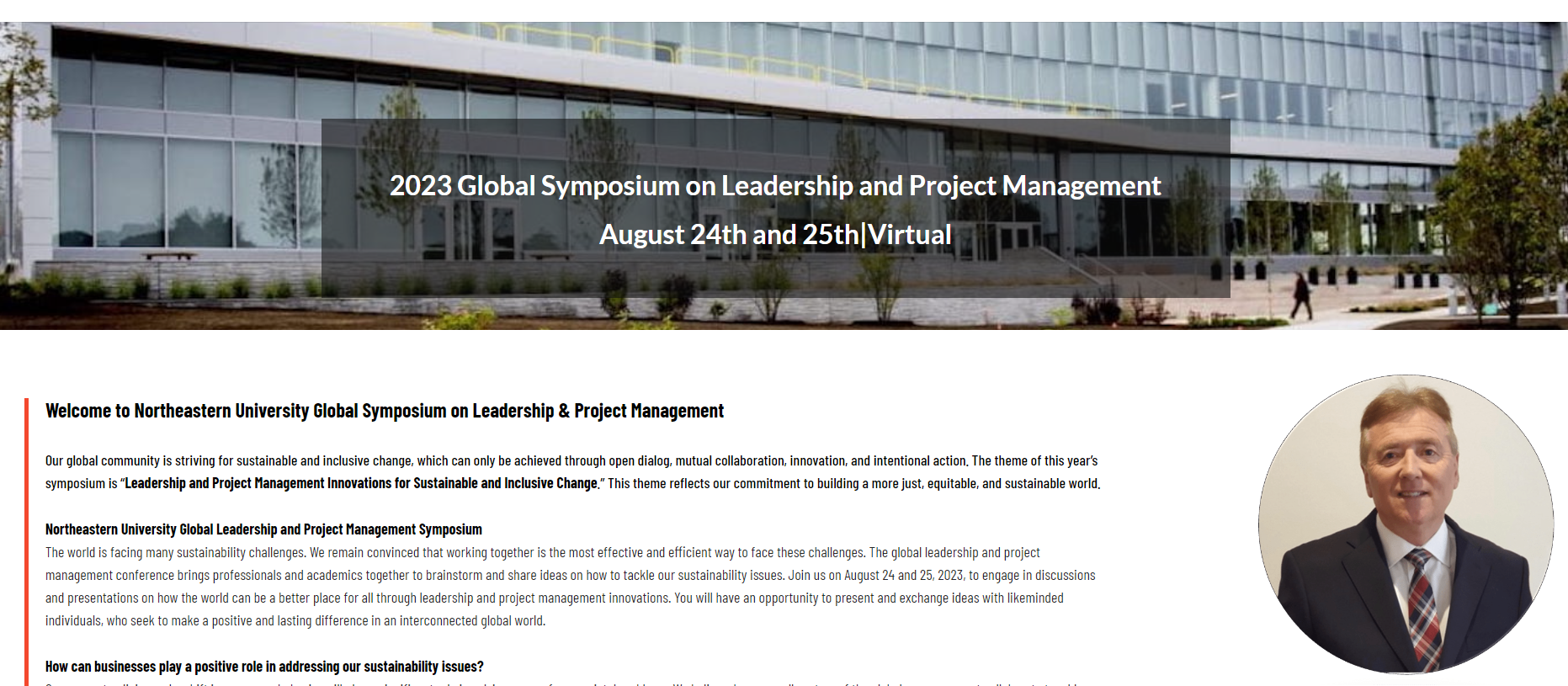Global Symposium on Project Management and Leadership

When
Where
Welcome to Northeastern University Global Symposium on Leadership & Project Management
Our global community is striving for sustainable and inclusive change, which can only be achieved through open dialog, mutual collaboration, innovation, and intentional action. The theme of this year’s symposium is “Leadership and Project Management Innovations for Sustainable and Inclusive Change.” This theme reflects our commitment to building a more just, equitable, and sustainable world.
Northeastern University Global Leadership and Project Management Symposium
The world is facing many sustainability challenges. We remain convinced that working together is the most effective and efficient way to face these challenges. The global leadership and project management conference brings professionals and academics together to brainstorm and share ideas on how to tackle our sustainability issues. Join us on August 24 and 25, 2023, to engage in discussions and presentations on how the world can be a better place for all through leadership and project management innovations. You will have an opportunity to present and exchange ideas with likeminded individuals, who seek to make a positive and lasting difference in an interconnected global world.
How can businesses play a positive role in addressing our sustainability issues?
Government policies and a shift in consumer behavior will play a significant role in solving some of our societal problems. We believe; however, all sectors of the global economy must collaborate to address our global and systemic problems. Businesses, in particular, are a key stakeholder in this quest to create more inclusive and sustainable societies. Business leaders must rethink and rebuild their cost and revenue models to integrate their impact on society and the natural environment. A question is the following: what leadership styles do we need to create and nurture more inclusive and sustainable societies?
The need for creativity and innovation
The industrial revolutions have contributed to the improvement of life expectancy in many societies. For example, thanks to advances in technology communications, a medical doctor in London, England, can collaborate with a colleague in a remote area anywhere in the world, to help a patient. Another case in point is the technological advances in transportation systems, which have facilitated greater economic and human interactions. However, we cannot ignore their many disastrous side effects. In a sense, one might argue that we innovated our way into the sustainability crisis (e.g., air pollution, water scarcity, poverty, and diseases caused by global warning). Can we innovate our way out of the crisis?
How can a collective action model of institutional innovation enable societal change?
Institutional innovation allows organizational leaders across industry sectors to work together to solve both economic and social problems when necessary. Successful institutional innovation requires alliances, networking, and partnerships among all stakeholders who can impact or who are impacted by the sustainability issues that we are trying to solve. Institutional innovation leads to institutional change, which can only be achieved through a diverse, inclusive, and participative decision-making process. How can we develop a framework that enables institutional innovation?

Keynote Speaker:
David Roberts is a business owner, consultant, and trainer. He designs and delivers customized programmes and best practice certifications for corporate executives in transformations, projects and business decision-making around the world. David started consulting practice whilst teaching on university MBA programmes as a young member of the Chartered Institute of Marketing. Twenty years later, following executive positions in global pharmaceutical companies and director positions in the UK and overseas public sector health organizations, negotiating, planning and completing major initiatives and transformations, he established his own organization, CUPE International. It became the 1st APMG Consultancy and Training Accredited Organisation in 2004, and since then has led strategy implementation, anticipating, and adapting services to ever-changing client requirements.
David is also a Non-Executive Director of the Agile Business Consortium since 2019, a Chartered Project Professional (ChPP) and Chartered Management Consultant (ChMC). He is also an occasional University guest-lecturer in Business Management, CMI Assessor and Auditor in Programme and Project Management best practice.
